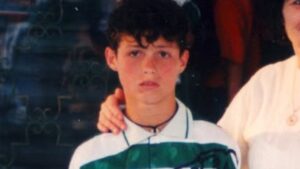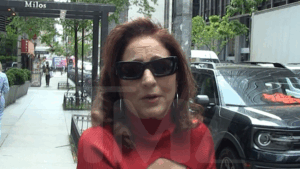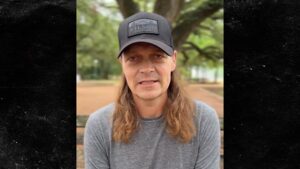
Autism Awareness Advocacy: 'Love on the Spectrum' Star James Jones Refutes RFK Jr.'s Claims
Autism Awareness Advocacy: ‘Love on the Spectrum’ Star James Jones Refutes RFK Jr.’s Claims
‘Love on the Spectrum’ star James Jones has become a powerful voice for autism awareness advocacy following his response to controversial comments. Image: NewsToday360
In a powerful display of autism awareness advocacy, “Love on the Spectrum” star James Jones has publicly challenged U.S. Health and Human Services Secretary Robert F. Kennedy Jr.’s controversial comments about autism. Jones’s response has resonated throughout the neurodivergent community, offering a firsthand perspective that directly contradicts the mischaracterizations presented by the government official. Through his platform, Jones is advancing autism awareness advocacy by showcasing his own life as evidence that autism is not a disease but simply a different neurological way of processing the world.
Table of Contents
James Jones’s Personal Testimony
Central to James Jones’s autism awareness advocacy is his willingness to share details of his own life that directly contradict the limiting stereotypes often associated with autism. In his response video, Jones presents himself as living proof that autism does not prevent individuals from leading full, independent lives.

James Jones gained recognition on Netflix’s ‘Love on the Spectrum’ and has since become an important voice in autism awareness advocacy. Image: NewsToday360
Autism is not a disease. It’s simply a neurologically different way of thinking. It doesn’t affect a person’s ability to be independent or to function in society.
Jones’s autism awareness advocacy includes specific examples from his life that demonstrate his independence and capabilities:
James Jones’s Life Examples
- Employment: Maintaining steady employment for years
- Transportation: Driving independently without assistance
- Relationships: Successfully navigating romantic relationships
- Daily Living: Managing everyday responsibilities autonomously
- Social Integration: Participating fully in community life
By sharing these concrete examples through his autism awareness advocacy, Jones provides a powerful counternarrative to the limiting perspectives that often circulate in public discourse about autism. His testimony serves as both a correction to misinformation and an inspiration for families with autistic children.
Addressing Common Autism Misconceptions
A significant aspect of Jones’s autism awareness advocacy involves tackling widespread misconceptions about autism that persist in society. One key point he addresses is the apparent increase in autism diagnoses, which RFK Jr. had attributed to environmental factors.
Why Autism Diagnoses Have Increased
Jones explains that the rise in autism diagnoses doesn’t indicate an “epidemic” but rather reflects improved understanding, better diagnostic criteria, and increased awareness. Previous generations of autistic individuals often went undiagnosed or were misdiagnosed with other conditions.
Through his autism awareness advocacy, Jones highlights how society is now more informed about the autism spectrum and better equipped to recognize neurological differences that have always existed in the human population. This improved understanding has led to more individuals receiving appropriate diagnoses and support.
Other Misconceptions Addressed
| Misconception | Reality |
|---|---|
| Autism is a disease that needs to be “cured” | Autism is a neurological difference, not a pathology |
| Autistic people cannot be independent | Many autistic individuals live completely independent lives |
| Autism always involves intellectual disability | Autism and intellectual ability are separate characteristics |
| Autistic people cannot form meaningful relationships | Autistic individuals can and do form deep connections |
| Autistic people lack empathy | Many autistic people experience intense empathy but express it differently |
Jones’s autism awareness advocacy offers a more accurate understanding of autism that counters harmful stereotypes and promotes acceptance rather than fear or pity.
Broader Community Response
Jones is not alone in his autism awareness advocacy efforts. His response to RFK Jr.’s comments has been joined by other prominent autistic individuals in the public eye, creating a chorus of authentic voices challenging mischaracterizations of the autism experience.
Eva Erickson’s Support
Eva Erickson, recognized as the first openly autistic contestant in “Survivor” history (Season 48), has added her voice to the conversation. Erickson’s unfiltered response reinforces the importance of listening to actually autistic individuals rather than accepting assumptions from those without firsthand experience.
This collective autism awareness advocacy highlights how neurodivergent individuals in entertainment are leveraging their platforms to educate the public and push back against harmful narratives. By speaking directly to their audiences about their lived experiences, they provide powerful counterpoints to misrepresentations of autism.

Media representation plays a critical role in autism awareness advocacy, with shows like ‘Love on the Spectrum’ helping to change public perceptions. Image: NewsToday360
The response underscores a growing movement within autism awareness advocacy that insists on “nothing about us without us”—the principle that discussions about autism should center autistic voices rather than being dominated by neurotypical perspectives.
RFK Jr.’s Follow-Up Statement
Following the widespread autism awareness advocacy response to his initial comments, RFK Jr. issued a follow-up statement attempting to clarify his position. According to reports, he claimed his comments were specifically addressing a small portion of individuals on the autism spectrum who face significant challenges, not the entire autistic community.
The Impact of Public Pressure
The fact that a high-ranking government official felt compelled to clarify his statements demonstrates the growing influence of autism awareness advocacy. Public figures are increasingly being held accountable for mischaracterizations of neurodivergent experiences.
For many in the autism community, however, RFK Jr.’s clarification does not fully address the underlying problematic framing of autism as fundamentally a problem to be solved rather than a natural variation in human neurology. This tension highlights ongoing challenges in autism awareness advocacy efforts to shift public understanding.
The Impact of Celebrity Autism Advocacy
James Jones’s public response illustrates the significant impact that media representation and celebrity autism awareness advocacy can have on public perception. As a recognizable figure from “Love on the Spectrum,” Jones has a platform that allows him to reach beyond the autism community to educate the broader public.
Why Media Representation Matters
Shows like “Love on the Spectrum” have created new opportunities for authentic autistic representation, allowing viewers to see beyond stereotypes and connect with the full humanity of autistic individuals. When stars from these shows engage in autism awareness advocacy, they build on the foundation of understanding that the programming has established.
The visibility of autistic individuals in entertainment who are open about their neurological differences helps normalize autism and reduce stigma. Through his autism awareness advocacy, Jones is not only correcting misinformation but also providing a role model for autistic youth who rarely see themselves represented positively in media.
By showing that I can hold a job, drive independently, and navigate relationships just like anyone else, I hope to demonstrate that autism doesn’t limit what we can achieve. It’s simply a different way of experiencing and interacting with the world.
The Continuing Need for Autism Awareness Advocacy
Despite progress in understanding autism, James Jones’s need to respond to RFK Jr.’s comments demonstrates that misconceptions persist even at the highest levels of government and society. This reinforces the continuing importance of autism awareness advocacy efforts led by autistic individuals themselves.
By sharing their lived experiences, advocates like Jones help move public understanding beyond outdated stereotypes and toward a more nuanced, accepting view of neurodiversity. Their autism awareness advocacy creates space for all autistic individuals to be recognized for their full humanity rather than being defined by misconceptions about their neurological differences.








The Comments Being Challenged
At the heart of this autism awareness advocacy moment is Jones’s response to RFK Jr.’s characterization of autism as a disease-like condition with environmental causes. Through his social media platform, Jones expressed being disheartened by the Health Secretary’s commentary, which appeared to frame autism through a deficit-based model rather than as a natural neurological variation.
Key Problematic Assertions
Jones’s autism awareness advocacy directly challenges the notion that autism represents something “wrong” with an individual. Instead, he reinforces the perspective shared by many autism advocates that neurodiversity should be recognized and respected as part of the natural variation in human neurological development.